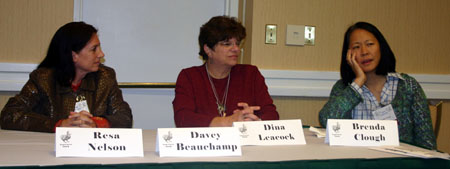 Panels started at 10 a.m. this morning but I felt it was more important to search for coffee than to get to the first panel of the day. I figured snoring or nodding off during a panel doesn’t set the right tone of interest in the audience for the panel members. So, off in search of coffee we went. We checked a couple of places that had cappuccinos listed outside but either they had no menu of what drinks they had or no staff manning the counter, or both. So, what’s a person to do but to go to Starbucks — open, with menu and staff. (Why not do the coffee in the hotel? It was those individual coffee thingys with real cups and I saw a couple of those videos on YouTube — you know the ones on hotels and glasses/cups. I forgot to bring my own this time so….).
Panels started at 10 a.m. this morning but I felt it was more important to search for coffee than to get to the first panel of the day. I figured snoring or nodding off during a panel doesn’t set the right tone of interest in the audience for the panel members. So, off in search of coffee we went. We checked a couple of places that had cappuccinos listed outside but either they had no menu of what drinks they had or no staff manning the counter, or both. So, what’s a person to do but to go to Starbucks — open, with menu and staff. (Why not do the coffee in the hotel? It was those individual coffee thingys with real cups and I saw a couple of those videos on YouTube — you know the ones on hotels and glasses/cups. I forgot to bring my own this time so….).
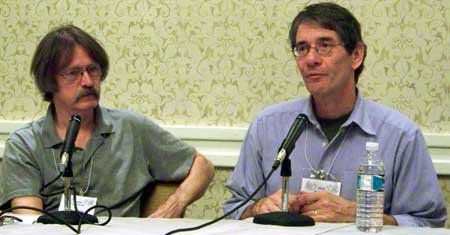
Peter Heck interviews Guest of Honor Michael Dirda
11 a.m. Guest of Honor Interview: Peter Heck interviews Michael Dirda.
I’ve enjoyed Michael Dirda’s book reviews in the Washington Post for years so I was very excited to get a chance to sit in on this interview. Dirda was an interesting speaker who, once asked a question, would just free-form answers with interesting information and insights.
(I took notes but if anything is wrong it’s my note taking) He talked about his early years as a student and being an erratic high school student. He when to Oberlin College and told them that if they gave him a scholarship he’d change his ways and really study. They did, so he did. However, he felt overwhelmed with the college atmosphere and some of the other students. His father encouraged him to work hard and finish when he thought of dropping out. He spent time in France and eventually moved to Washington, DC to be near his girlfriend (eventual wife).
He talked about how serendipity has often played a role in his landing jobs. He’s written an autobiography of sorts so, for extended detail, check it out. But he told of his first review for the Washington Post. He’d talked to them and didn’t hear anything for months then was asked if he’d review a book. He said yes, and they sent the book by courier. He knew the review should be 250 words but not when it was due so he read the book that night (Friday), then polished and honed the prose, typed it up on really nice paper (paper with the texture/feel/lushness of vellum since he wanted to make a good impression) and sent it to them express on Monday. The WP people were really impressed because they expected it to take two months. He talked to them about doing more reviews and they were so-so about it but then as the meeting was breaking up one of the editors asked about the paper and where he could get it. Dirda said if you give me some more assignments, I could get you a ream. The rest, of course, is history.
In his time at the Washington Post, he often asked people to review books outside their areas of specialties but still related to things they enjoyed. He had an author who did reviews of literature do a review of a book on jazz, since he knew he liked and enjoyed jazz. He tried to break genres. He got into doing the science fiction and fantasy reviews when their SF/F reviewer moved on to another position.
His belief is that if a book is well-written, telling a great story that resonances with the reader, then it is a good book no matter what genre it’s in. Literature more of less transcends genre — they are books that are patterning book for people and genre is irrelevant. The point is that people shouldn’t limit themselves or their reading. Don’t go through life with blinders on. (I add to that thought that you especially shouldn’t go through life with self-imposed blinders on.)
Heck asked about what happens if you don’t like a book. Dirda basically said he doesn’t tend to read books he doesn’t enjoy. He may occasionally give a mixed review but has done very few negative reviews in his career. This topic led to discussing the prevalence of reviewing sites on the internet. One of the ways to get a reputation and readership on the internet is to do negative, snarky reviews. Usually, these are easy to write but don’t do a service to the authors or the readers of the review. Most of the negative reviews that he’s done have been when a well-known author just doesn’t seem to care anymore.
He strongly believes that once people get out of school they should be reading for pleasure. This brought up the point that as a professional reviewer, he does get pleasure from the books he reads but that he seldom gets a chance to read for pleasure. (A distinction that I feel is very important and was happy to hear him talk about as I do a lot of reviewing myself.)
Asked if he reread books, Dirda said that he did. That there are some books that are comfort books either because of the story, the characters, the language, the setting, or combination of these elements. They give comfort to the reader. Some books are reread because at the time of the first reading, you may not have gotten the subtext or full experience of reading it. He talked about a book he read in his teens and reread in his thirties and the on the second reading, he understood that there was so much more that he didn’t get as a teen.
I was so impressed with his talk, that I put in a bid in the silent auction on his books. If I don’t get one, I’ll buy them, but the auction is for the medical fund of SFWA (Science Fiction Writer’s Association). Can’t beat getting what you want while helping others.
Then we took a break and stopped to talk to people we hadn’t seen in a while. Caught up and blathered on until the paranormal romance panel. We also went back to our room to see if the hotel had managed to do the odor neutralizer thing — nope. So, we sprayed the neutralizer we’d bought again. The smell has changed to a fruity one from the floral one it was earlier — weird.

Girl Meets Monster panel
1 p.m. Girl Meets Monster, Gets Boyfiend: Paranormal Romances. What is paranormal romance? Is it absorbing urban fantasy or is it a completely separate genre? Why is it so popular? Why now? Should it be filed under romance or fantasy?
Panelists: Victoria Janssen (moderator), Traci Castleberry, Maria V. Snyder, and Mindy Klasky.
The first part of the panel they tried to come up with some key items that define the terms and seemed to agree on the following.
Romances are expected to have H.E.A. or Happily Ever After endings. Paranormal Romances also tend to have HEAs. If there is not a happily ever after ending, or no real resolution, it’s probably Urban Fantasy.
In a Paranormal Romance, romance is the key to the story and they usually have a lighter tone and the subplot is the plot that drives the romance. In Urban Fantasy, the fantasy is key and the romance is a subplot and there is usually a darker tone or noir feel. In traditional fantasy there is more emphasis on world building and the setting and language.
Paranormal romances generally have a woman as the main character. Urban fantasy can have either a male or female be the main character.
Discussed the over abundance of vampires as love interests. Some discussion of Dracula being the genesis of the desirability of the monster. Everyone thought Sunshine by Robin McKinley to be a wonderful paranormal romance though it wasn’t marketed as one. They said that they’d like to see more playing with the rules and expectations and the romance with something other than a vampire or werewolf.
We took another break to check our room and spray the odor neutralizer again — now the floral scent is back. The strength is less so I think the odor neutralizer is helping but it doesn’t seem to go away completely. We’ve now heard of at least four rooms with this problem. The hotel is willing to move us but I hate moving once we settle in. I keep hoping they’ll figure out the problem but they don’t use scented cleaners and have no idea what’s causing this. At least it’s not triggering my allergies anymore — it’s just annoying.

Small Press, Big Impacts Panel
4 p.m. Small Press, Big Impact: What is the role of the small press in today’s publishing environment? What can they do that the big ones can’t? How do you start a press and is this just a hobby or can you make a living at it?
Panelists: Sean Wallace, Michael Dirda, Michael Walsh, Lawrence M. Schoen, and John Betancourt.
The upshot of the panel seems to be that you can, if you work hard enough, make a living being a small press — but it’s not easy. Print on Demand (POD) has made a big difference in a small press’ ability to compete.
Amazon.com has also been a help as it gets your books out to the public if the big chains don’t buy copies or carry them in the stores.
One of the definitions of a small press is that they make less than $6 million a year. None of the panelists said they even come close to exceeding that criteria. Most view this 6 million dollar line with a telescope. That one of the hardest things is to get the title out there and to get the word out about the book. It helps to get advance reader copies to the appropriate reviewing venues and Publisher’s Weekly and Kirkus are important. Also, not accepting returns helps to limit your risk.

Ending Stories Panel
5 p.m. Ending Stories: Bang or Whimper. So many short stories start out well but end abruptly or just trail off, leaving the reader to wonder “What was the point?” Why does this happen and how can writers avoid this fate? Is a twist ending a cheat?
Panelists: Dennis Danvers, Barbara Krasnoff, Allen Wold (moderator), Brenda Clough.
There’s a saying: The first chapter sells your book and the last chapter sells your next book.
There was a lot of discussion about ‘change’ being required to have an ending. That a story is about how somebody is confronted with a problem and succeeds or fails and the resolution changes the person (or the reader).
Sometimes the ending may seem to be a bad one if you don’t recognize who the story is about. The Nancy Drew stories aren’t about Nancy Drew, she’s just the catalyst that allows the story/mystery to exist and be solved.
Star Wars has two ending. The first is when Luke rescues Princess Leia and the second is when the Death Star is destroyed. The second couldn’t happen without the first because Leia has the connections needed to make the second happen so it’s really two stories with endings.
A high level story is when you finish a story and you see the world differently. The reader is changed. A bad story is one where you wonder, “Why did I bother to read this?”
If you are writing a story where the climax is not the point, then there is no such thing as a weak ending. If a story is really great you can leave off the end because it’s inevitable from what has gone before — this concept was especially tricky and there was a lot of talk back and forth about not having an ending because it was implied….
We went out with friends to supper to Inkas Empire. The food was very good and reasonably priced. We had a great time getting to know some new people.
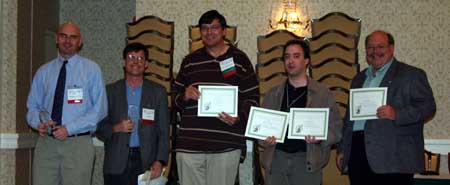
2nd Annual WSPA Awards
8:30 p.m. Award Ceremony & Party
Celebrated the second annual WSFA Small Press Award and learned this year’s winner. And eat cake.
WSFA Small Press Award Finalists were:
- “Bufo Rex” by Erik Amundsen, Weird Tales, Issue 347.
- “Orm the Beautiful” by Elizabeth Bear, Clarksworld Magazine, January 2007.
- “The Wizard of Macatawa” by Tom Doyle, Paradox, Issue 11.
- “Harry the Crow” by John Kratman, Aeon Speculative Fiction, Issue 12.
- “Mask of the Ferret” by Ken Picks and Alan Loewen, from the book Infinite Space, Infinite God, Twilight Times Books.
- “The Third Bear” by Jeff VanderMeer, Clarksworld Magazine, April 2007.
The Winner of the award this year is:
“The Wizard of Macatawa” by Tom Doyle, Paradox, Issue 11.
Tom Doyle and Paradox magazine, each received an engraved trophy. Tom also received a check for $250.
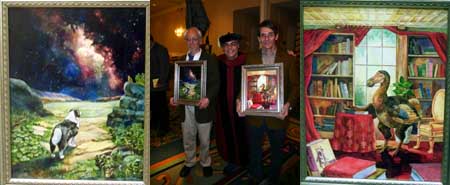
Gifts for the Guests of Honor
Next the Capclave Guests of Honor were given gifts. WSFA commissioned an artist (Lynn Perkins) to create a work for each guest. Michael Dirda received a painting of a Dodo in a library. Each of the books in the library is one that Dirda has written about and recommended. James Morrow received a painting of his dog (now deceased) in a field with a background of stars and a hint of the rainbow bridge (or so it appears to me). Both seemed very pleased with their paintings.
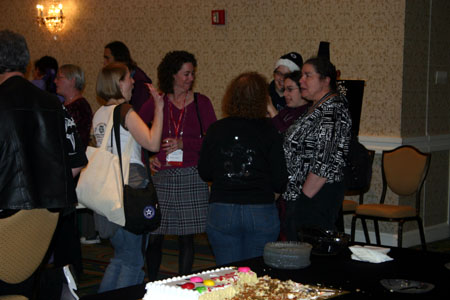
After Awards Cake and Chit Chat
Next we all had cake and plenty of opportunity to sit and talk with other Capclave attendees. We stayed way too long to talk and enjoy the company of Capclave members more than we should have, considering we had to get this blog post up tonight. So, the photos will be added in tomorrow.
[Hyperion: Pictures are finally in.]
 Friday night was the 3rd Friday meeting of WSFA. It was a very long business meeting and the upshot is that there is going to be some exciting news about Capclave 2009 very soon now. Updates and news about what’s happening at Capclave can be found on the new Capclave blog.
Friday night was the 3rd Friday meeting of WSFA. It was a very long business meeting and the upshot is that there is going to be some exciting news about Capclave 2009 very soon now. Updates and news about what’s happening at Capclave can be found on the new Capclave blog.





